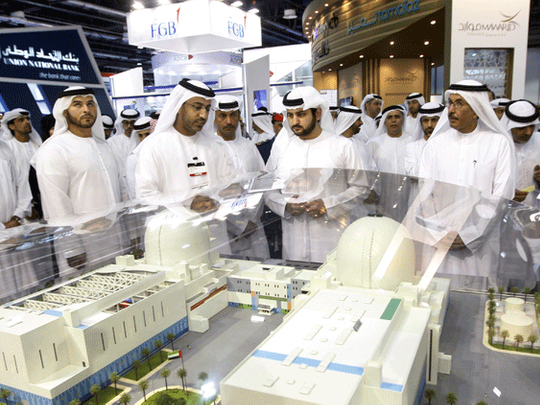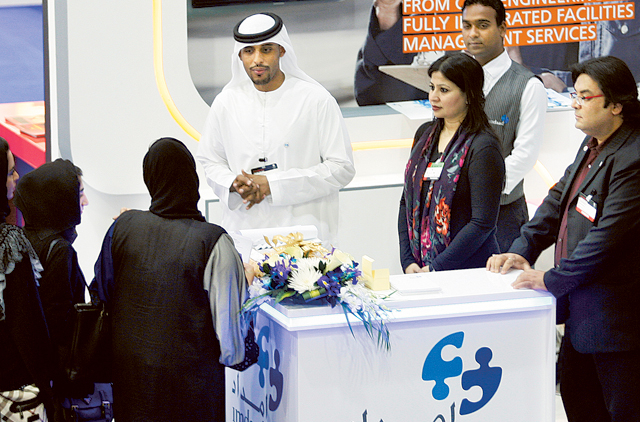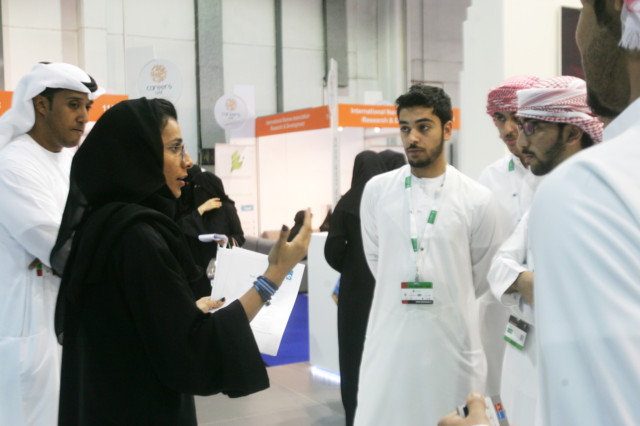
Dubai: Working hours and finding candidates with the right attitude are one of the biggest challenges that private and semi-private companies face in the Emiratisation process, participating companies at Careers UAE 2014 told Gulf News.
Careers UAE 2014, one of the biggest Emirati recruiting fairs in the UAE, was inaugurated on Tuesday by Shaikh Maktoum Bin Mohammad Bin Rashid Al Maktoum, Deputy Ruler of Dubai.
This year, 90 out of the 160 companies were from the private sector, a significant increase of 29 per cent, which can be attributed to companies wanting to comply with the UAE’s seven-year national agenda of increasing Emiratisation.
According to the UAE Ministry of Labour, around 22,000 Emiratis currently work in the private sector — constituting 9.7 per cent of the total Emirati workforce of approximately 225,000.
To learn more about the challenges that private and semi-private companies might face in the Emiratisation process, Gulf News spoke to companies at the fair.
“Working hours are one of the biggest challenges in attracting Emiratis to join the private sector,” said Moza Al Raqbani, Head of Emiratisation at Majid al Futtaim, which is looking to hire 65 Emiratis this year.
To deal with the challenge Al Raqbani said offering part-time shifts and flexibility is important. “For example we make sure that female Emiratis get the morning shift,” Al Raqbani.
Farida Hussain, in charge of Emiratisation at the Al Rostamani group, which is hiring 50 Emiratis this year, also said working hours are a challenge. She added that competition from other companies looking to hire Emiratis is also proving to be difficult.
“We try to attract candidates so that they chose us over other companies by offering better benefits and vacations,” said Hussain. “For example, we give them a vacation when they get married, if they want to study. We also have something called the loyalty allowance, where they get around Dh6,000 extra every year.”
Farida added that changing Emiratis’ perspectives on the private sector is also challenging.
Anil Lamba, Group HR Director at AW Rostamani, which is hiring 15 Emiratis this year, also said having flexible hours is important.
“The trick is flexibility,” Lamba said. “If you want Emiratis you need to understand what their needs are and try to meet them.”
Meccia Abdullah, Emiratisation Business partner at Al Futtaim, which is looking to hire 100 Emiratis, said maturity and flexibility are the characteristics of ideal candidates.
“I, on the other hand, think that Emiratis are more open than before to working on the private sector,” said Abdullah. “We have around 600 Emiratis working full-time.”
Al Futtaim is looking to hire 1,000 Emiratis in the next three years.
Meanwhile, Dubai Government Human Resources Department (DGHR) announced that it is offering 1,600 jobs across 30 specialties.
Amal Bin Udai, Director General of DGHR, said: “DGHR focuses on Emiratisation in both private and public sector. Careers UAE is a tremendously good opportunity for job-seeking Emiratis and it has grown in both the size of the exhibition space as well as the number of participants.”
Jobs in all areas are on offer at government entities such as the Directorate General of Residency and Foreigners Affairs and the General Administration of Civil Defence.
In total, 2,680 jobs were on offer from some of the fair’s major companies, which were interviewed by Gulf News.
Open exclusively for UAE nationals and HR practitioners, Careers UAE 2014 will continue until Thursday (April 24) at Dubai World Trade Centre in Halls 1-4 at DWTC. The fair will be open exclusively to females from 10am to 2pm on Wednesday.














